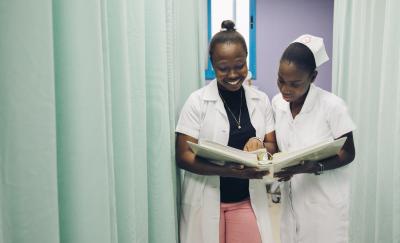Authors
Gabriella Newes-Adeyi, Tyler Morrill, Abt Global; Lawrence Reichle, (formerly Abt Global); Sarita Mohanty, Michael Daugherty, Kate Woodworth, Kristina Wielgosz, Romeo Galang, Pete Maniatis, Vera Semenova, Fatimah S. Dawood, Centers for Disease Control and Prevention (CDC); Ashley N. Battarbee, Alan T. Tita, UAB School of Medicine; Michael Varner, The University of Utah Health Sciences Center; Melissa S. Stockwell, Mirella Mourad, Raul A. Silverio Francisco, Columbia University Medical Center
How has SARS-CoV-2 (COVID-19) affected birth outcomes for pregnant persons, and is there a correlation between SARS-CoV-2 infections and preterm live birth? More than three years after the start of the pandemic, researchers are still looking for – and finding – answers. While many studies state that most SARS-CoV-2 infections during pregnancy are mild, others have reported associations between prenatal COVID-19 and adverse pregnancy outcomes. Researchers aim to better inform and advise pregnant persons on the risks of prenatal SARS-CoV-2 infections on newborns, especially as different variants continue to emerge.
During August 2020–October 2021 the Epidemiology of SARS-CoV-2 in Pregnancy and Infancy (ESPI) study enrolled a cohort of pregnant women at less than 28 weeks gestation at three U.S. medical centers in Salt Lake City, UT; New York City, NY; and Birmingham, AL. Participants were followed with systematic surveillance until the end of their pregnancies, self-collecting and returning weekly nasal swab specimens. Additional swab specimens were collected when the particpants experienced any onset of COVID-like symptoms: fever, cough, shortness of breath, etc. Those enrolled also provided blood samples to test for SARS-CoV-2 antibodies as evidence of infection.
Among 954 participants with a live birth, 185 (19%) had evidence of SARS-CoV-2 infection during their pregnancy and 123 (13%) had preterm births. Overall, there was no significant association between preterm birth and SARS-CoV-2 infection during pregnancy. While the infections studied in this analysis were predominantly deemed mild and/or asymptomatic, COVID-19 vaccination for pregnant persons remains important to prevent severe infections that may be associated with additional complications.
Take a deeper dive into this publication to learn more!



